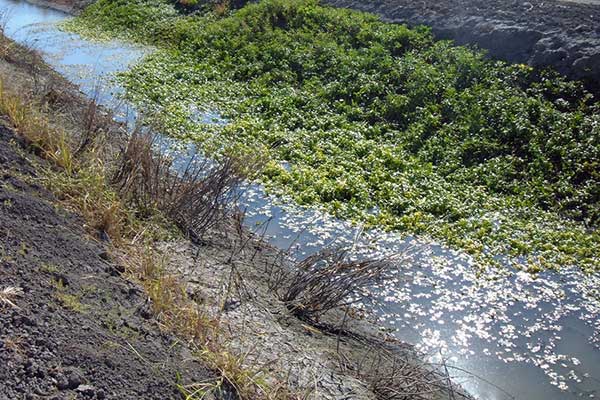Letters to the Editor for February 9, 2020.
Dear Sebastian Daily,
As a 30 year resident of Sebastian, I am writing to you to voice a few points in regard to our recent and ongoing environmental topics.
I have worked in the turfgrass industry for over 20 years now, held a pesticide applicator license for the same duration, earned an AS degree in turf management over 15 years ago, and also am working on a BS degree in an unrelated field.
Additionally, I have been responsible for multiple Audubon Cooperative Sanctuary re-certifications through the years. I am in no way telling you this to portray myself as an expert on the subjects at hand, but I do however, believe I know a bit more than the most citizens speaking at our council meetings and workshops. I have not attended any of these meetings or workshops since I work in the area and want to avoid any conflicts of interest.
Glyphosate
We are beyond arguing whether or not it causes cancer, so I will refrain from voicing an opinion. I doubt we will ever actually prove one way or another, so moving forward. There are alternatives, but keep in mind they have lower LD ( lethal dosage) numbers, meaning the toxicity level is greater than glyphosate products.
The cost will be higher but in reality, not worth an argument since the increased herbicide cost alone is unlikely enough to impact our city’s budget significantly. The “organic” weed killers in my experience work very poorly. I have no experience with W.O.W., but my guess is it will burn down vegetation temporarily but recover quickly, requiring a higher application frequency and higher use rate.
Parks
From what I have observed, our parks have not had nor need a lot of chemical control other than fire ant prevention. They are fields maintained mostly via mechanical methods such as mowing and trimming. Herbicides (weed killers) really only need to be used around structures and again is minimal.
The product mentioned by our city manager, Top Choice, in my opinion, is by far the safest and most effective insecticide (bug killer) to be applied for fire ant control. The active ingredient is Fipronil. It carries a caution label (not danger or warning, LD# >5000) and is the same active ingredient used around most of our homes for termite prevention (Termidor, Taurus), and is also on many of our pets for flea control under the name Frontline.
It is a granular product applied with a spreader, not sprayed. It bonds well with soil, giving it a long residual. One application per year substantially reduces fire ant mounds, approx. 90-95%, thus keeping topical treatments of ant mounds with ant bait products to a minimum. While amusing… digging, raking, or any other mechanical alternatives will not be effective on this issue. (Explosives do sound fun, however).
Golf Course/Ball Fields
A higher level of maintenance is a must at these sights. All of what was mentioned for parks, plus a handful of selective herbicides (meant to kill weeds in turf without harming turf). Fungicides will also be needed on occasion in select areas. The good news is almost all the products carry caution labels, (high LD#’s, low toxicity). If we opt out of using these products, turf quality will degrade quickly. All these products should be applied by experienced staff using Best Management Practices (BMP) as mentioned in our meetings and workshops.
At our last workshop a representative from IRC made a few comments about the ball field maintenance. (Mow more, no herbicides, add milorganite occasionally). This will not work for our ball fields. What was not said is that all fields worth mentioning are sub-contracted out.
These sub-contracted fields include both Vero Beach High School and Sebastian River High School, soccer fields at fairgrounds, Storm Grove, Gifford Elementary, and many more. I promise you the level of maintenance at these fields is much higher than what was portrayed.
Waterways
The area to which I have the least expertise, but a few points to think about:
We can start using organic alternatives to glyphosate, be regardless we are still killing plant matter which then decays thus increasing nitrates and organic matter running into our lagoon.
We can stop all chemical treatments and go all mechanical, but mostly likely we will be unsuccessful in keeping the waterways clear. Will this mechanical method require machinery? If so are endless hours of combustion really any better for the environment?
No clear answer here, as you can see there are pros and cons to whatever we decide. My opinion says its a bit of both of these methods, most importantly keeping the BMP concept in mind. Use the chemicals carefully, as needed, and apply them safely. Control only the vegetation which truly needs control (blockages and invasive species).
If you live on any of our waterways, have you done your part on ensuring your property doesn’t directly contaminate by creating a buffer? Buffers are areas of no pesticides, no fertilizers, no irrigation, and vegetation is maintained at a much higher height. They serve to filter runoffs from directly entering our waterways. Can we as a city make this mandatory? I’m tired of seeing lawns mowed down to the waters edge which in my opinion is one of the biggest culprits of our waterway pollution, yet also somehow some of the most vocal residents.
The points mentioned above only really scratch the surface of these issues, but I hope some of the information may be helpful.
Truth is there is no easy answer to all this, our state’s population has tripled in the last 50 years and growth wont be slowing anytime soon. It is us causing these problems, so we need to make informed (not emotional) decisions moving forward to best serve our environment now and into the future.
Anonymous
Sebastian Resident
